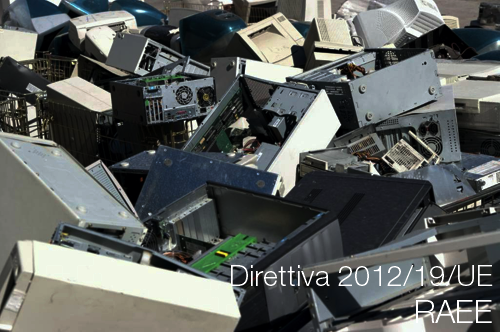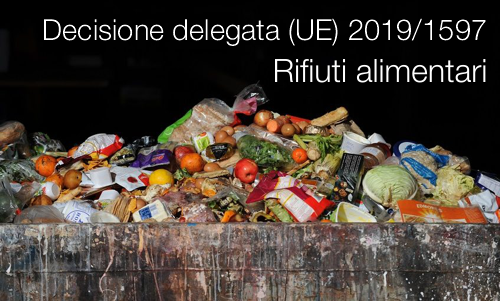Direttiva 2012/19/UE

Direttiva 2012/19/UE / RAEE / Testo consolidato Aprile 2024
ID 2403 | Update 09.05.2024
Direttiva 2012/19/UE del Parlamento Europeo e del Consiglio del 4 luglio 2012 sui rifiuti di apparecchiature elet...
This report provides an overview of bio-waste prevention, generation, collection and treatment in Europe.
It aims to support countries by sharing experience and best practice. Bio-waste (Box ES.1) can play an important role in the transition to a circular economy, by both preventing its generation and capturing its potential as a source of valuable secondary resources (Figure ES.1). The focus of this report is on food and garden waste from households and similar public and commercial activities such as food services.
European circular economy and waste policies
increasingly address bio-waste as one of several key waste streams.
These include new targets for the recycling and preparing for reuse of municipal waste and an obligation for separate collection for bio-waste. Moreover, EU Member States are required to monitor food waste generation and to have a food waste prevention programme, supporting Sustainable Development Goal 12.3 — to halve food waste by 2030. The 'Farm to fork' strategy on sustainable food within the EU's Green Deal (EC, 2019a) will reinforce food waste prevention.
Bio-waste accounts for more than 34 % of the municipal solid waste generated, amounting to 86 million tonnes in 2017 in the EU-28 (28 EU Member States for the period 2013-2020). Recycling bio-waste is therefore crucial for meeting the EU target to recycle 65 % of municipal waste by 2035.
The level of separate bio-waste collection differs considerably across Europe. Many countries are far from capturing bio-waste's full potential. Implementing a separate bio-waste collection system is a sometimes lengthy and always complex process. It needs a comprehensive and coordinated policy framework embedding a bio-waste strategy into broader waste and circular economy strategies.
Targets or pay-as-you-throw schemes will create clear incentives to divert bio-waste from residual waste. Awareness-raising activities, providing good information to consumers and matching treatment capacity to the volume of separately collected bio-waste are other crucial factors.
Food waste accounts for nearly two thirds (60 %) of all bio-waste from households and similar sources. More than other waste types, preventing food waste is perceived as an ethical responsibility for society. It is associated with a waste of economic resources and their resulting negative environmental externalities. Generally, in the majority of European countries, food waste stands out as a priority in waste prevention policies. The most common policy actions to address food waste are awareness-raising and information campaigns.
Other common measures are food redistribution platforms and increasing promotion of retailers' second-class food sales. However, measuring the effectiveness of waste prevention activities or policies is still a challenge. In the future, harmonised data should enable us to compare the potential impact of different policy mixes for preventing food waste applied in European countries.
Composting (treatment in the presence of oxygen) and anaerobic digestion (treatment in the absence of oxygen) are currently the two most widely applied treatment techniques. Composting dominates the treatment capacity but the use of anaerobic digestion is increasing.
Anaerobic digestion generates biogas and is thus a source of renewable energy. The preferred treatment technique depends on the composition of the bio-waste and the properties of the separate collection system, but anaerobic digestion tends to deliver higher environmental benefits.
According to the Waste Framework Directive's definition, bio-waste comprises 'biodegradable garden and park waste, food and kitchen waste from households, offices, restaurants, wholesale, canteens, caterers and retail premises and comparable waste from food-processing plants'. Food waste, a key component of bio-waste, can be edible (e.g. food purchased but not eaten, leftovers from meals) or non-edible (e.g. banana peel or bones). The edible part is targeted by food waste prevention measures. Apart from bio-waste, there are other biodegradable wastes, for example paper and cardboard waste, wood waste and natural fibres in textiles. However, these are outside the definition of bio-waste and are not addressed in this report.
Collegati

ID 2403 | Update 09.05.2024
Direttiva 2012/19/UE del Parlamento Europeo e del Consiglio del 4 luglio 2012 sui rifiuti di apparecchiature elet...

della Commissione, del 3 maggio 2019, che integra la direttiva 2008/98/CE del Parlamento europeo e del Consiglio per quanto riguarda una metodologia comune e requisiti...
Regolamento recante norme per l'istituzione ed il funzionamento del comitato per l'Ecolabel e l'Ecoaudit.
(G.U. n. 231 del 3 ottobre 1995)
Modificato da: Decreto 12 giugno 1...
Testata editoriale iscritta al n. 22/2024 del registro periodici della cancelleria del Tribunale di Perugia in data 19.11.2024